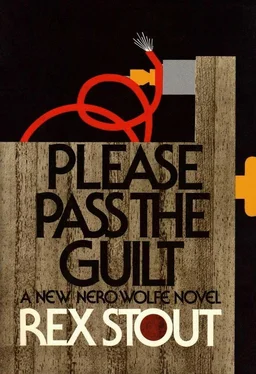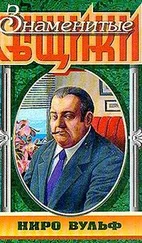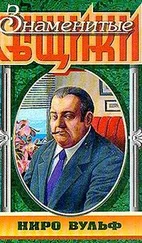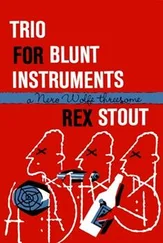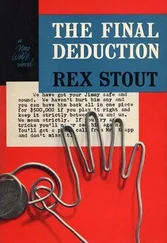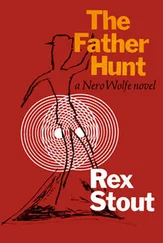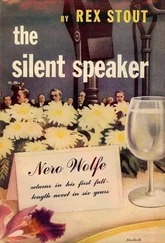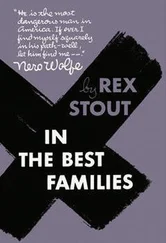“You haven’t listened,” Wolfe told her. “I said that I had little hope of getting any useful facts from you, and I could have added that even if I do, you probably won’t know it. For instance, the question I ask you now. About three months ago CAN had a special program called ‘Where the Little Bombs Come From.’ Did you see it?”
“Yes. Of course.”
“Then you know that the preparation for that program required extensive research. There had to be numerous contacts between members of the CAN staff and people who knew about bombs and had had experience with them. Call them the sources . Now I ask you regarding three weeks ago — Friday, May sixteenth, to Sunday, May eighteenth — where and how did you spend that weekend? It may help to remember that the Tuesday following, two days later, Mr. Odell died.”
“But why do you—” She wasn’t squinting; her eyes were wide in a stare. “Oh. You think I went to one of the ‘sources’ and got a bomb. Well, I didn’t.”
“I don’t ‘think’ anything. I’m trying to get a start for a thought. I asked where and how you spent that weekend. Have you a reason for not telling me?”
“No. I have no reason for telling you either, but I might as well. I’ve told the police four or five times. I took a train to Katonah late Friday afternoon and was a house guest of friends — Arthur and Louise Dickinson. They know nothing about bombs. I came back by train Sunday evening.”
I had got my notebook and a pen and was using them. Wolfe asked, “Mr. Meer? Have you any objection to telling me how you spent that weekend?”
“Certainly not. I drove to Vermont Friday evening and I hiked about forty miles in the mountains Saturday and Sunday, and drove back Sunday night.”
“Alone, or with companions?”
“I was alone. I don’t like companions on a hike. Something always happens to them. I helped some with the research for that program, and none of the ‘sources’ was in Vermont.”
“I am hoping that Mr. Browning will tell me about the sources. Later. Miss Lugos?”
Her face was really worth watching. As he pronounced her name, she turned her head for a glance at Browning, her boss. It was less than a quarter-turn, but from my angle it wasn’t the same face as when she was looking at Wolfe. Her look at Browning didn’t seem to be asking or wanting anything; evidently it was just from habit. She turned back to Wolfe and said, “I stayed in town all that weekend. Friday evening I went to a movie with a friend. Saturday afternoon I did some shopping, and Saturday evening I went to a show with three friends. Sunday I got up late and did things in my apartment. In a file at the office we have a record of all the research for that program, all the people who were contacted, and I didn’t see any of them that weekend.”
Wolfe’s lips were tight. In his house, “contact” is not a verb and never will be, and he means it. He was glad to quit her. “Mr. Falk?”
Falk had been holding himself in, shifting in his chair and crossing and uncrossing his legs. Obviously he thought it was all crap. “You said,” he said, “that you wouldn’t try to emulate the police, but that’s what you’re doing. But Peter Odell was my best and closest friend, and there may be a chance that you’re half as good as you’re supposed to be. As for that weekend, I spent it at home — my place on Long Island. We had four house guests — no, five — and none of them was a bomb expert. Do you want their names and addresses?”
“I may, later.” As Wolfe’s eyes went to Mrs. Browning, her husband spoke: “My wife and I were together that weekend. We spent it on a yacht on the Sound, guests of the man who owns it, James Farquhar, the banker. There were two other guests.”
“The whole weekend, Mr. Browning?”
“Yes. From late Friday afternoon to late Sunday afternoon.”
I put my eyes on my notebook and kept them there. With all the practice I have had with my face, I should of course always have it under control, but I had got two jolts, not just one. First, was that why Wolfe had started the whole rigmarole about that weekend, to check on Browning, and second, had Browning heard it coming and got set for it, or had he just given a straight answer to a straight question? I don’t know how well Wolfe handled his face, since my eyes were on my notebook, but otherwise he did fine. There were two or three other questions he must have wanted to ask Browning, but he didn’t. He merely remarked that he doubted if Mr. Farquhar or the other guests were in the bomb business and then said, “And you, Mr. Abbott?” and my eyes left the notebook.
“I resent this,” Abbott said. “I knew Pete Odell for twenty years and we worked together for ten of them, and I have a warm and deep sympathy for his wife, his widow, but this is ridiculous. I assumed you would have some new angle, some new approach, but all you’re doing, you’re starting the same old grind. Each of us has spent long hours with the police, answering questions and signing statements, and while we want to oblige Mrs. Odell, naturally we do, I certainly don’t think she should expect us to repeat the whole performance with you. Why doesn’t she ask the police to let you see their files? In one of them you’ll find out how I spent that weekend. I spent it at home, near Tarrytown. There were guests. I played golf all day and bridge at night. But I repeat, this is ridiculous.”
A corner of Wolfe’s mouth was up. “Then it would be fruitless to continue,” he said — not complaining, just stating a fact. He put his hands on the edge of his desk for purchase, pushed his chair back, and rose. “I’ll have to contrive a new approach. On behalf of Mrs. Odell, I thank you again for coming. Good evening.” He moved, detoured again between the wall and the red leather chair, and, out in the hall, turned left.
“I’ll be damned,” Theodore Falk said.
I think they all said things, but if any of it was important, that will be a gap in this report. I wasn’t listening, as I went through the appropriate motions for godspeeding a flock of guests. I had heard enough, more than enough, for one evening. I didn’t even notice who went with whom as they descended the seven steps of the stoop to the sidewalk. Closing the door and sliding the chainbolt in its slot, I went to the kitchen. Fritz, who had kept handy to fill orders for refreshments if called for, was perched on the stool by the big center table with a magazine, but his eyes weren’t on it. They were on Wolfe, who was standing, scowling at a glass of beer in his hand, waiting for the bead to settle to the right level.
“It’s going on eleven o’clock,” I said. “I would love to start on it right now, but I suppose I can’t.”
“Of course not,” he growled. He drank beer. “Do we need to discuss it?”
“I don’t think so.” I went and got a bottle of scotch from the cupboard. There are times when milk will not do. “I have a suggestion. Do you want it?”
He said yes, and I gave it to him.
At five minutes past eleven Tuesday morning, I was seated in a comfortable chair at the end of a big, expensive desk in a big, expensive room on the thirtieth floor of a big, expensive building on Broad Street, near Wall, facing a man whose tan was much deeper than Theodore Falk’s — so deep that his hide might have been bronze.
Getting to him had been simple, but first I had had to confirm that he existed and owned a yacht. At one minute past nine I had dialed the number of the magazine Fore and Aft ; no answer. Modern office hours. Half an hour later I got them, and was told by a man, after I held the wire while he looked it up, that a man named James J. Farquhar had a fifty-eight-foot Derecktor cruiser named Prospero . So it was a yacht, not just a rowboat with a mast or an outboard motor. Next I dialed the number of the Federal Holding Corporation, and via two women and a man, which was par, got through to Avery Ballou. He sounded as if he still remembered what Wolfe and I had done for him three years ago, and still appreciated it. I told him we needed a little favor and asked if he knew a banker named James Farquhar.
Читать дальше
